ENG/ESP Entrepreneurship and Innovation.
There are some books you are required to read because the university says so. You don't always pick them out of personal interest, but along the line, they find a way to speak to you. Entrepreneurship and Innovation, used for GST 221 in the University of Uyo, is one of those books that unexpectedly opened up my eyes to something bigger than what I thought I was signing up for.
Coming from the Department of History and International Studies, I honestly didn’t expect much from a GST course on entrepreneurship. I thought it was just another general course that I had to pass and move on. But reading through the book, especially as someone interested in storytelling and how people build things over time, I realized that the ideas in this text had more relevance than I initially assumed. It wasn't just about business or money. It was about mindset, initiative, creativity, and resilience things that apply to every field, not just to those dreaming of opening a shop or launching a startup.
The book started by laying a foundation on the meaning of entrepreneurship. It made me rethink what the word even means. Before, I thought entrepreneurship was all about someone trying to hustle or sell something. But this book explained it differently. It described an entrepreneur as someone who sees a need, develops a solution, and takes calculated risks to make it happen. That sounds like something anyone, even a historian should pay attention to.
The part that touched me the most was the section on innovation. It explained how innovation doesn’t always mean inventing something new from scratch. Sometimes, it's about improving an existing idea, finding a better way of doing things, or even combining two old methods to produce something more effective. That definition made innovation feel more reachable. It made me realize that I didn’t need to be a tech genius or a millionaire to be innovative. Even within my academic discipline, I could find ways to improve how things are done, whether in teaching, research, or community development.
Another part of the book that stayed with me was the chapter that focused on identifying business opportunities. It used real-life Nigerian examples, and that helped me see the relevance of the content. It talked about everyday needs that we sometimes ignore, like providing clean water in rural communities or creating local food processing services, and how these simple observations could lead to impactful businesses. Reading this made me respect people who take initiative and build solutions, even in small ways. I also started observing my environment differently, trying to notice problems not as complaints but as doors to ideas.
One important topic the book didn’t ignore was the challenges faced by Nigerian entrepreneurs. From poor power supply to lack of funding and bureaucratic bottlenecks, the book didn’t sugarcoat things. But it also didn’t stop there. It gave suggestions on how entrepreneurs can navigate these issues through partnerships, digital tools, creative problem-solving, and persistence. It showed me that the road may be rough, but there are still people pushing through and building businesses against all odds. That part made the book realistic, not just motivational.
Something else that made the book stand out was how it addressed personal development. It stressed that every entrepreneur must work on themselves first. That includes building strong values, learning how to manage time, setting clear goals, and staying disciplined. In a world where distractions are everywhere and consistency is hard, I found this section very timely. It reminded me that success is not automatic. It comes with intentional growth and preparation.
The book also introduced readers to basic business planning and financial literacy. For someone like me who’s more familiar with historical timelines and philosophical arguments, this was an area I found challenging at first. But the book explained it in simple terms. Concepts like budgeting, record-keeping, profit and loss, and marketing strategies were broken down in ways that even a non-business student could understand. I may not be running a business yet, but I now understand what goes on behind the scenes when people try to build something sustainable.
Finally, what made this book truly impactful for me was the subtle way it encouraged self-belief. It didn’t shout it out, but the stories, examples, and practical steps quietly pushed one to believe that ordinary people can do extraordinary things if they are determined and strategic. Whether it’s starting a small agro-business in your village or launching an online clothing brand, the message was clear, start where you are, use what you have, and keep learning as you grow.
Reading Entrepreneurship and Innovation as a GST 221 student at Uniuyo didn’t turn me into an entrepreneur overnight. But it shifted something in me. It made me realize that beyond my degree, beyond the exams and lectures, I carry the potential to create value. It made me believe that with the right mindset, anyone can innovate, not just in tech or commerce, but in any field of life.
In conclusion, Entrepreneurship and Innovation may be a general course textbook, but it carries weight. It speaks to the young Nigerian student in a language that is honest and practical. Whether you are in History, Engineering, or Fine Arts, the book has something that challenges you to think, to observe, and to act. And for that, I’m truly grateful I read it.
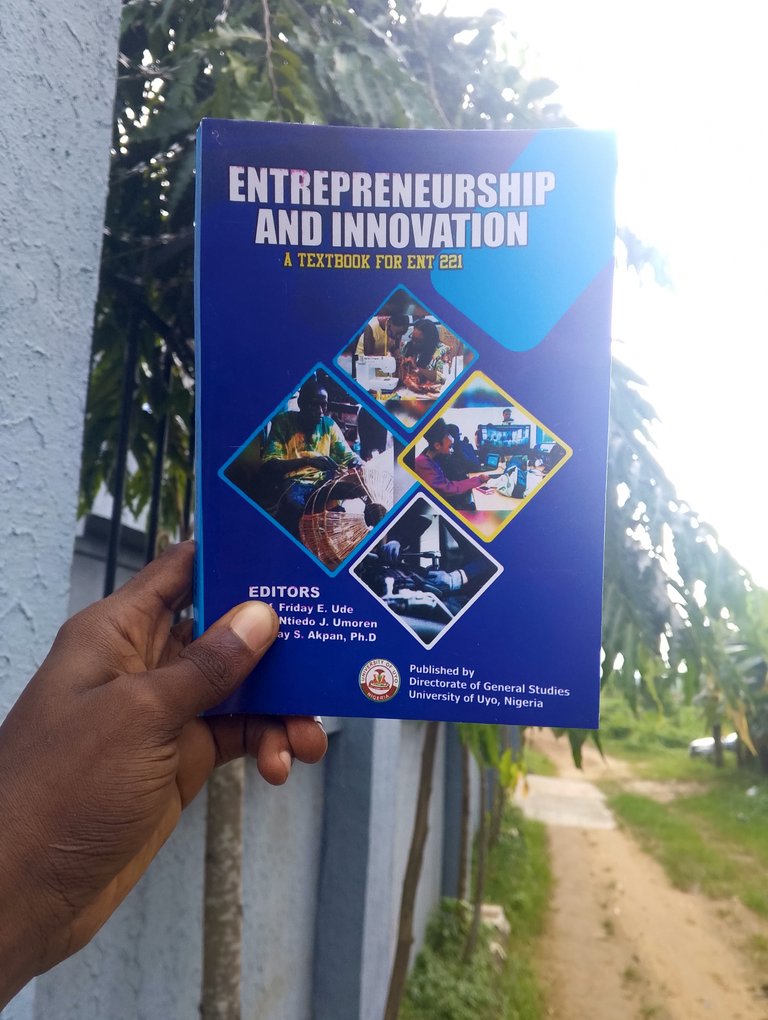
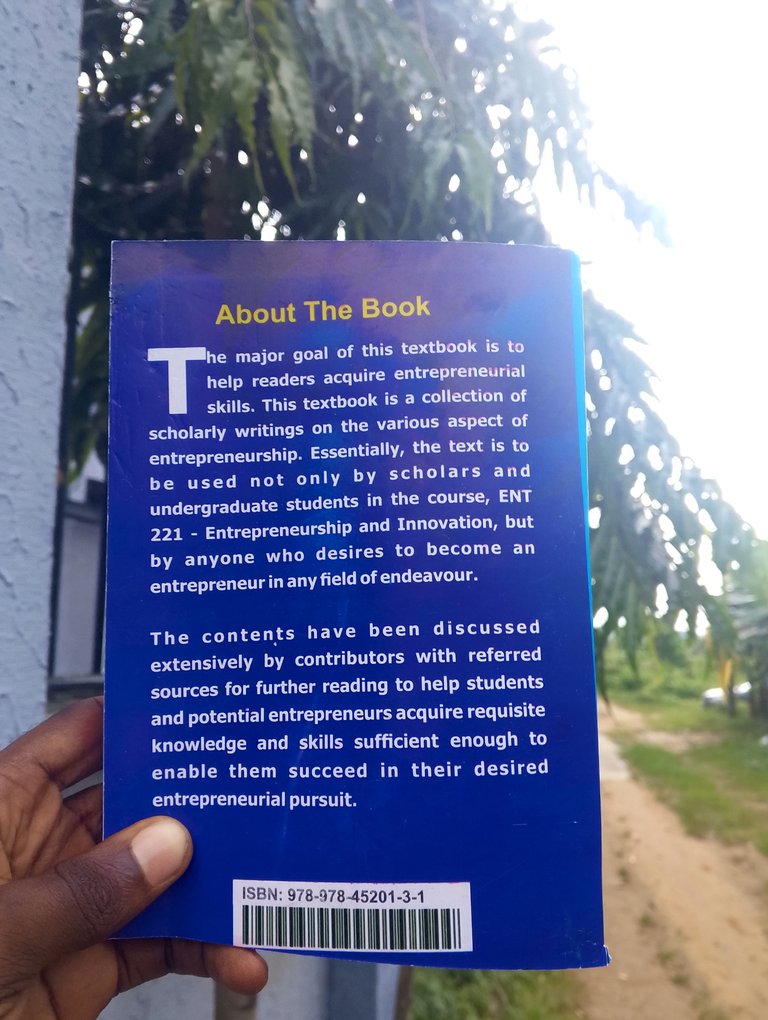
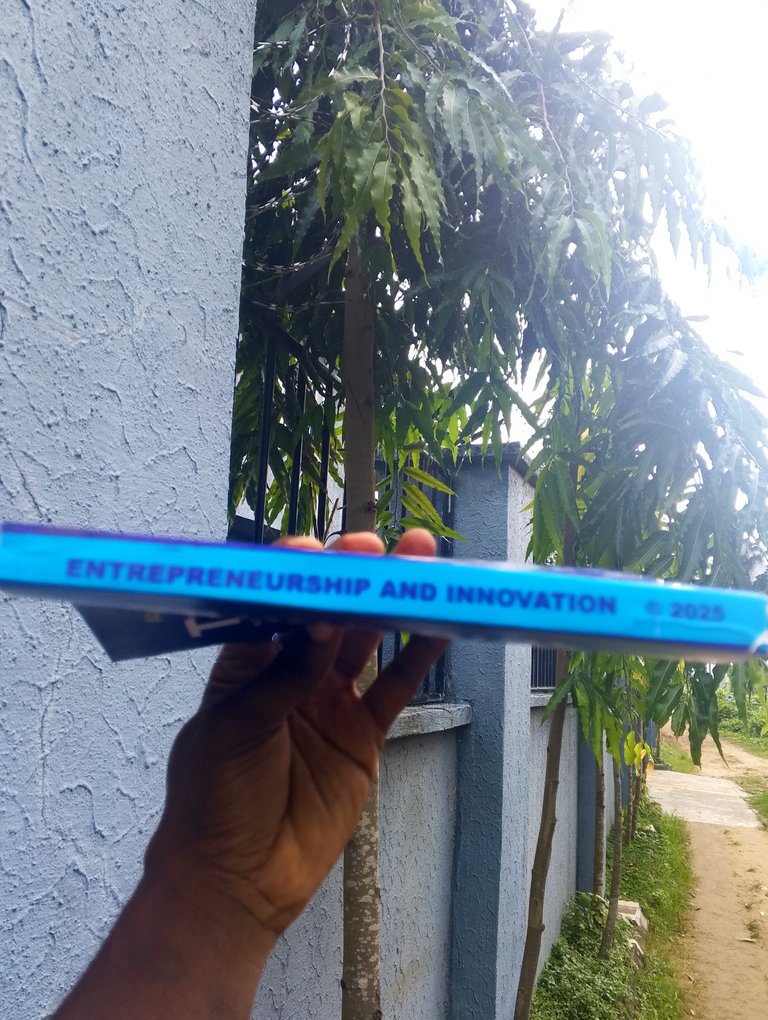

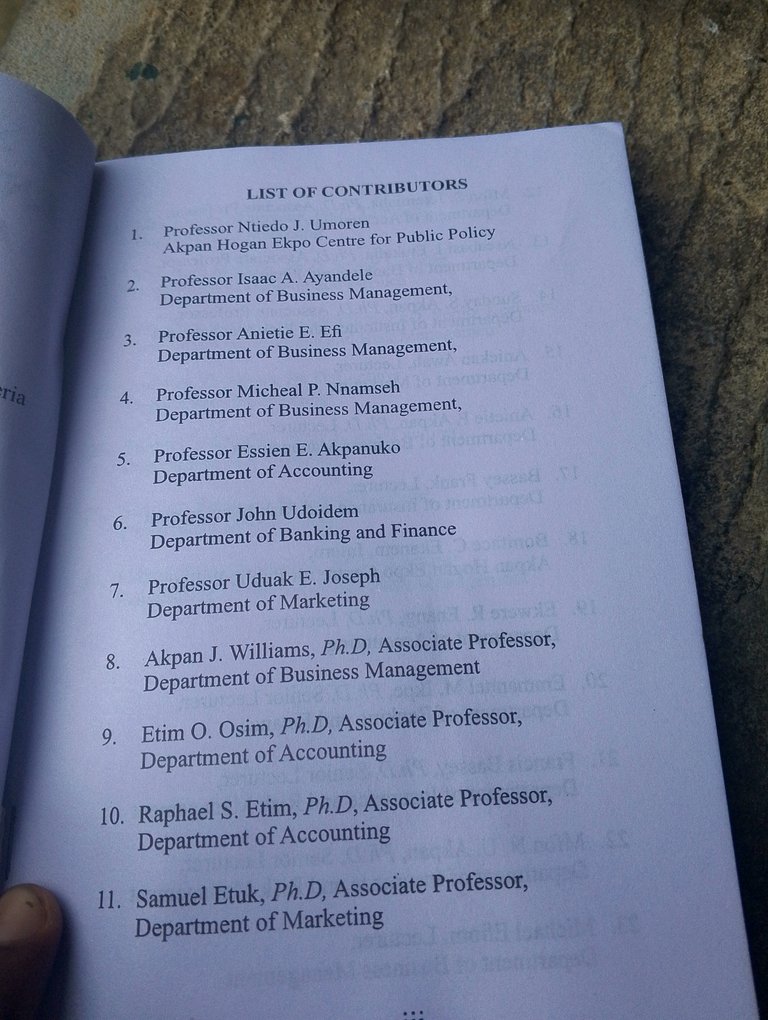
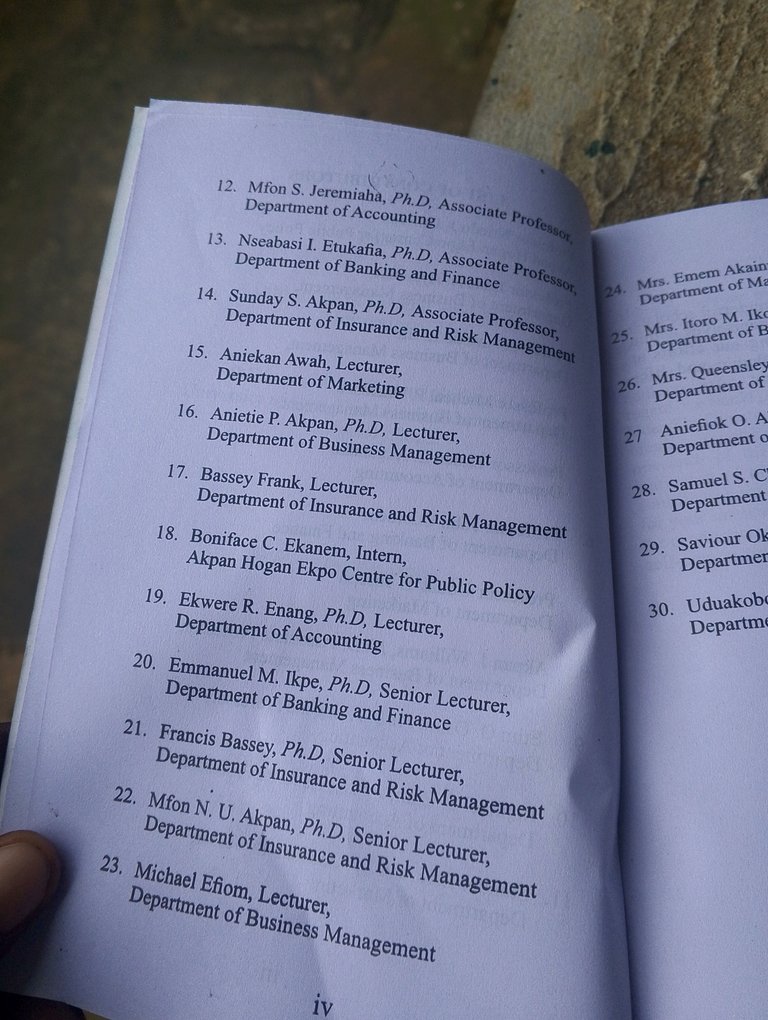
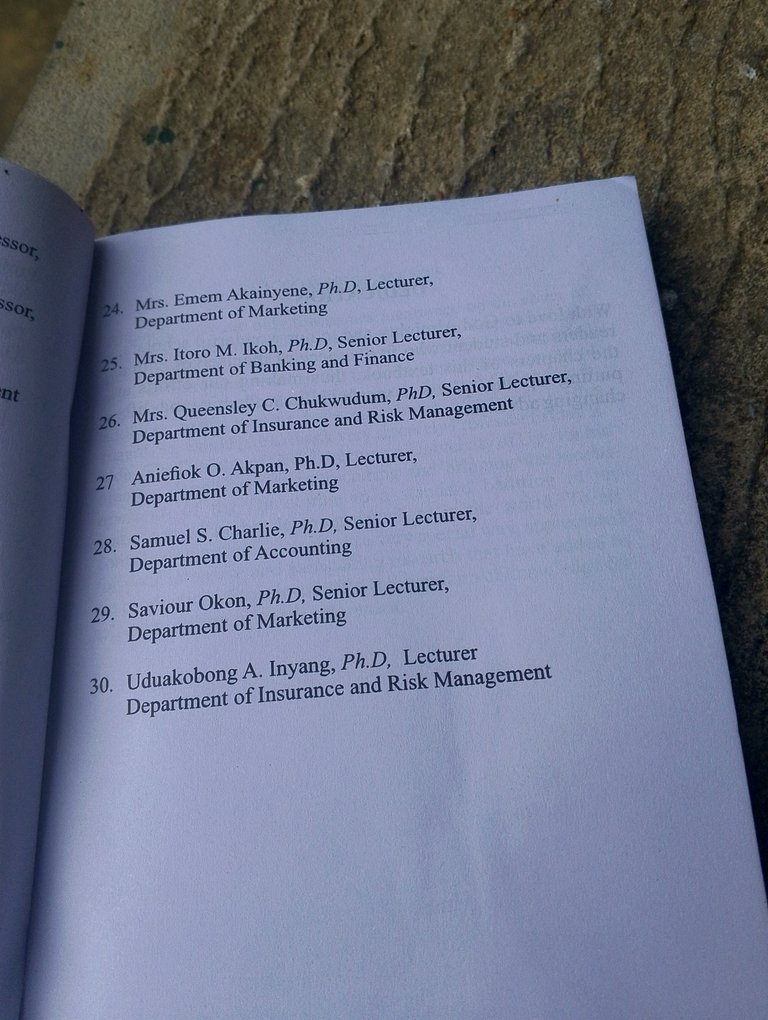
Entrepreneurship and Innovation
Nunca pensé que un curso de GST pudiera enseñarme tanto sobre la vida fuera del aula. Como estudiante de Historia y Educación en la Universidad de Uyo, siempre he estado enfocado en el pasado: estudiando civilizaciones antiguas, influencias coloniales, revoluciones y todo lo que ha dado forma a lo que somos hoy. Pero el libro Entrepreneurship and Innovation, que usamos en GST 221, me hizo girar la mente hacia el futuro. Me hizo preguntarme no solo qué quiero hacer con mi carrera, sino qué valor puedo crear con mis ideas, mis habilidades y mi forma de ver el mundo.
Lo primero que me llamó la atención fue la forma en que el libro está estructurado. No es un texto académico aburrido lleno de teorías difíciles. Usa ejemplos reales, lenguaje sencillo y explicaciones claras que hacen que hasta los conceptos más técnicos parezcan fáciles de entender. Desde el principio, el libro redefine lo que significa ser emprendedor. No se trata solo de abrir un negocio, sino de tener una mentalidad. Eso me cambió la perspectiva. Yo pensaba que los emprendedores eran solo personas con dinero para montar empresas. Pero ahora entiendo que se trata de cómo piensas: ver un problema y encontrar una solución útil.
Una de mis partes favoritas fue la sección sobre la innovación. Aprendí que innovar no siempre significa crear algo completamente nuevo o tecnológico. A veces, se trata simplemente de hacer algo común de una forma diferente. Esa creatividad que aplicas en un proceso, un producto o un servicio es lo que lo convierte en algo valioso. El libro dio ejemplos sencillos — como agricultores que mejoran el empaque de sus productos o mujeres del mercado que aceptan pagos digitales — y eso me hizo ver que la innovación también vive en la vida diaria nigeriana.
Otra cosa que me gustó del libro fue cómo despierta un sentido de responsabilidad. Habla del papel del emprendedor en el desarrollo del país, en la creación de empleos y en el crecimiento de la economía. Eso me hizo reflexionar. Como estudiante de historia, siempre he estudiado cómo el liderazgo y las decisiones políticas cambian el rumbo de los pueblos. Pero no había considerado cómo los negocios, por pequeños que sean, también construyen sociedad. Ahora entiendo que si queremos un mejor país, no todos tenemos que ser políticos. También podemos ser creadores, solucionadores de problemas, personas que aportan valor.
El libro también habla de los desafíos que enfrentan los emprendedores. No todo es color de rosa. Se discuten temas como la falta de financiación, la competencia en el mercado, las políticas gubernamentales y el miedo a fracasar. Me gustó mucho que el texto no idealiza la experiencia emprendedora. Te prepara mentalmente para los obstáculos y te anima a ser fuerte. El capítulo sobre planificación de negocios fue bastante práctico. Enseña cómo desarrollar una idea, cómo escribir un plan y cómo comprobar si es viable. Eso me pareció muy útil porque es algo que puedo aplicar si algún día quiero iniciar mi propio proyecto.
Antes pensaba que los temas de negocios solo le interesaban a los estudiantes de contabilidad o administración. Hoy veo las cosas de otro modo. Este curso me enseñó a mirarme por dentro y empezar a pensar como una persona que soluciona problemas. Ya sea iniciando algo pequeño con la moda, organizando guías de estudio o ayudando a otros estudiantes, ahora sé que una simple idea, si se cultiva bien, puede volverse algo grande.
Recomendaría este libro a cualquier estudiante, sin importar su carrera. No es solo para quienes quieren abrir un negocio. Es para todos los que quieren entender el mundo del trabajo, la economía y la creación de valor. Te siembra una semilla de confianza. Te ayuda a despertar la creatividad y te empuja a dejar de esperar a que las oportunidades lleguen y más bien empezar a crearlas.
Una de las frases más poderosas que encontré en el libro fue: “En cada desafío hay una oportunidad de negocio.” Esa línea se me quedó grabada. Ahora, veo mi entorno con otros ojos. Desde las filas largas en la cafetería hasta compañeros que necesitan ayuda con tareas o alguien que necesita entregar algo hay ideas por todas partes.
Agradezco a la Universidad de Uyo por hacer este curso obligatorio. Al principio, pensé que era solo un requisito más. Pero hoy lo veo como una llamada de atención. Me recuerda que la educación no es solo obtener un certificado. Es tener las herramientas para afrontar la vida con confianza, habilidades y propósito.
Coincido con todo lo que expresas en tu post. La universidad va mucho más allá de un título. Es todo lo que aprendemos en ella para toda la vida.
Congratulations @miztajovial! You have completed the following achievement on the Hive blockchain And have been rewarded with New badge(s)
Your next target is to reach 35000 upvotes.
You can view your badges on your board and compare yourself to others in the Ranking
If you no longer want to receive notifications, reply to this comment with the word
STOPCheck out our last posts: